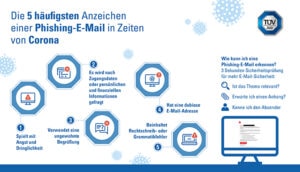
Informed employees can better recognize phishing attacks by e-mail with anti-phishing tips and thus contribute significantly to protecting the company. uniscon gives companies important tips that they should convey to their employees.
German companies, reports TÜV SÜD with reference to the current phishing report from Cofense, are particularly often targeted by criminal phishing attacks. This risk has increased since the beginning of the corona pandemic.
A TÜV SÜD infographic shows how you can identify suspicious emails - and we tell you what you can do to protect yourself and your employees effectively against phishing attacks.
What is phishing anyway?
Phishing is the attempt to obtain personal data from Internet users via fake e-mails or websites and thus to commit identity theft. The fake pages and messages usually imitate the layout and design of well-known brands (such as banks, online retailers and social networks). The users are asked to reveal their access data, which are then passed on to the perpetrators and abused by them. Phishing is a form of social engineering.
Here's what you can do to protect yourself against phishing
Learn to recognize phishing e-mails: To protect yourself effectively against phishing attacks, you must first learn to recognize fake e-mails. Look out for the following signs in email:
Play with fear and urgency
Fraudsters often play with the user's fear and try to provoke a rash act, such as giving access data. Do not be disturbed by supposedly urgent emails!
You will be asked for login details or personal information
Most large companies do not ask their customers for their user data, especially not by email. If you are asked to provide login information, that is suspicious.
Uses an unfamiliar greeting
"Dear customer" ... that's strange, isn't it? Usually, companies you are in contact with will address you by name. Generic or incorrect salutations in e-mails are an indication of phishing.
Has a dubious email address
Did the last e-mail from your bank have a different sender address than the e-mails you received before? Then be careful! A phishing attempt can often be identified if you pay close attention to the sender's email address.
Contains spelling and grammatical errors
If the email is teeming with errors, you are most likely dealing with a phishing email. However, the criminals keep getting better - and not every phishing attempt is that easy to identify!
Further tips for dealing with phishing emails for employees can be found on the blog.
More on this in the Idgard blog at uniscon.com
About uniscon Uniscon GmbH is a member of the TÜV SÜD Group. As part of TÜV SÜD's digitization strategy, uniscon offers highly secure cloud applications and solutions for secure and legally compliant data traffic. TÜV SÜD is a leading global technical service company with over 150 years of industry-specific experience and today more than 24.000 employees at around 1000 locations in 54 countries. In this strong network, uniscon is able to reliably implement major international projects in the areas of IoT and Industry 4.0 with the Sealed Cloud and its products. Further information on the company and the solutions: www.uniscon.com

